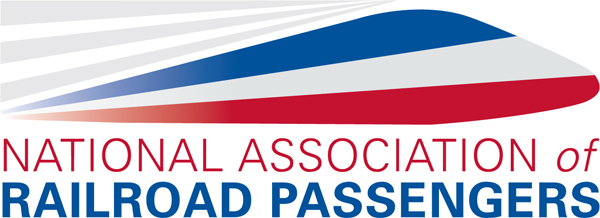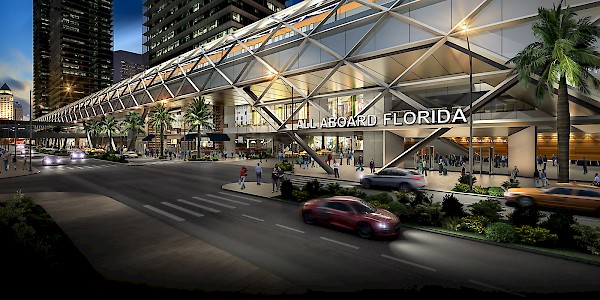Hotline #923
August 7, 2015
All Aboard Florida secured approval to sell $1.75 billion in municipal bonds from the Florida Development Finance Corporation (FDFC) on August 5. The proceeds of the bond issuance will help finance creation of a $2.5 billion privately-run rail corridor that will connect communities between Miami and Orlando with frequent, fast train service.
All Aboard president Michael Reininger was on hand to speak about the huge economic boost the service would bring to Florida. The company is investing $700 million into the project up front, which will directly create thousands of jobs. That doesn’t include the many more indirect jobs that will be created through transit-oriented development around the stations in West Palm Beach, Fort Lauderdale, and especially downtown Miami. Reininger also soothed fears about the risk of public liability as a result of this private sector-led project.
"No state or county entity will have any financial exposure as a result" of this project he told the FDFC.
NARP members rallied in the lead up to the hearing, sending in dozens of messages of support. NARP Council Member Bill Hutchison attended to help represent passenger interests, and was able to provide the following report:
“The room was packed. I'd estimate between 300-400 attendees, with All Aboard Florida supporters in the majority. Speakers included U.S. Representatives Corrine Brown and Alan Grayson, both of whom mounted ringing endorsements of All Aboard Florida. Brown also went after (anti-rail group) Florida NOT All Aboard over the Railroad Rehabilitation and Improvement Financing (RRIF) program, saying projects like All Aboard Florida are exactly why the RRIF program was created. She also attacked them on the safety issue, noting that the rail industry is to have PTC signaling by 2016 and that All Aboard Florida will be 100% compliant.
“One big surprise for me was the appearance of Robert Crandall, former head of American Airlines, who lambasted All Aboard Florida as a waste of taxpayer money. Funny coming from a man whose industry has been very adept at taking advantage of federal subsidies and bailouts for decades! Talk about hypocrisy!”
The Indiana Department of Transportation announced August 1 that it had successfully signed a long-term agreement with Amtrak, Iowa Pacific Holdings, and several communities served by the Hoosier State train.
INDOT promoted its commitment to improving the passenger experience:
“State and local governments are contracting with the private sector to improve the service and provide new amenities, making it competitive with driving or taking the bus. Iowa Pacific will offer fresh food and drinks, including alcoholic beverages, for purchase on board. Passengers can stay productive or enjoy the journey with limited free Wi-Fi service in all passenger cars. The Hoosier State’s Wi-Fi network uses available bandwidth from cellular carriers along the tracks.
“One of the three Iowa Pacific passenger cars will be a unique dome lounge, which will soon house business-class seating with hot meals and drinks included. For a limited time, Hoosier State coach passengers may enjoy the dome lounge and its curved glass windows that extend overhead at no additional charge. Seats are available on a first come, first served basis, and each table generally seats four passengers.
“In addition, the contracts allow flexibility for possible future improvements in schedule, frequency or connecting bus service.”
Amtrak is still providing operating crew and reservations for the train.
The Fresno Bee is reporting that the Fresno County Council of Governments (Fresno COG)is moving ahead with a plan to use $750,000 in a local transportation sales tax revenue to help secure land for the maintenance facility for the statewide high-speed rail corridor.
Fresno COG is partnering with the California High-Speed Rail Authority and a local developer to secure a parcel of land for the facility, which would bring 1,500 rail-related jobs to the region. The effort is being led by Fresno Works, a coalition of leaders from representing local businesses, the community, and elected officials that are working to convince the state of California to select Fresno to build the maintenance base.
“We know we’re going to have to acquire the property,” said Fresno County Supervisor Henry Perea, who is also co-chair of Fresno Works. “This just gets the ball rolling a little earlier. It’s important to secure the options on the land.”
The New Jersey State Senate Committee on Oversight will hold a hearing examining recent events surrounding the deterioration of the aging Hudson River Tunnels on August 10 in Trenton.
Amtrak executive vice president for Northeast Corridor business development Stephen Gardner will attend to give the local officials a briefing on Amtrak’s operations and capital investment plans.
NJ TRANSIT Executive Director Ronnie Hakim has publicly backed Amtrak’s maintenance plan. “They’re doing everything necessary,” said Hakim. “That’s our engineering judgment.”
However, Amtrak says that without a new tunnel to provide backup to the existing rail tunnels, which are over 100-years old, passengers should expect more painful commutes.
“This tunnel is going to be harder and harder to keep functioning reliably,” warned Gardner earlier this week. “It’s unreasonable to expect that there’s not going to be further kinds of disruptions or additional outages needed over several years ahead.”
“The tunnel repairs forced the diversion of Midtown Direct trains to Hoboken, severely overcrowded PATH trains and buses, and exacerbated traffic delays for motorists. We need to know why,” said State Senator Robert Gordon (D-Bergen), who chairs the committee. “We also need to know what long-range contingency plans NJ Transit and Amtrak have in place in case one of these Sandy-damaged tunnels has to close not for a few hours, but for 18 months, sometime during the next 10 years before a new rail tunnel can be built. We need to know the status of financing plans for Amtrak’s proposed Gateway rail tunnel, and what we need to do to expand trans-Hudson rail capacity.”
Of course, NARP members know why the NEC is facing an investment crisis. And the solution: predictable, dedicated federal funding for passenger trains.
Texas transportation officials released cost estimates this week for the planned Lone Star Rail District, which would connect San Antonio, New Braunfels, San Marcos, Austin, and Georgetown. The line would link several key business centers and travel hubs, including the San Antonio airport, Texas State University, the University of Texas at Austin, and the Texas state capitol.
Initial costs are estimated at $500,000, but planners would be looking a predictable level of long-term investment to lay a solid foundation for the service.
“Five years from now, the city would be contributing $3.6 million, and 15 years from today their ask from the city would be $9.2 million,” said Mike Frisbie, San Antonio's Director of Transportation. "It's not just about cash payments, it is also about a 36 year agreement, which would lock in the city to paying for the Lone Star Rail District for 36 years.”
The Associated Press is reporting that Massachusetts-based Boston Surface Railroad Co. has expressed interest in launching a privately-operated commuter rail service between Worcester, Massachusetts, and Providence, Rhode Island.
The service would take advantage of a 45-mile stretch of track owned by Providence and Worcester Railroad Co. Passengers could expect to travel end-to-end in under an hour, and company officials say operations could begin as early as 2017.
"Because we're private, because it's an existing railroad, because they're willing to operate it for us, we don't have to spend ridiculous money," said Boston Surface Railroad C.E.O. Vincent Bono.
The Iowa Department of Transportation will be holding a public meeting in Ames, Iowa on August 20 to solicit public feedback on the state rail plan.
The plan will identify the most important projects between 2016 and 2019, a necessary step in securing federal passenger rail and transit grants.
You can find out more at IowaDOT.gov.
Passenger Advisory
—New Jersey Transit is advising passengers that track work on the Northeast Corridor between Newark and Secaucus will force the cancellation of inbound and outbound 7600-series trains on August 8 and 9.
“As a result of single tracking, Northeast Corridor, North Jersey Coast Line, and Morris & Essex Line trains into and out of New York may be subject to 10-15 minute delays,” said NJT.
—Amtrak announced that in order to accommodate long-term track work, Springfield Shuttle Trains 470, 476, 479, 490, 493 and 495 will be canceled Monday through Friday through July 2016. Passengers will be provided bus service to and from stations in New Haven, Wallingford, Meriden, Berlin, Hartford, Windsor, Windsor Locks and Springfield.

